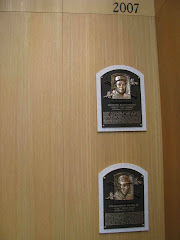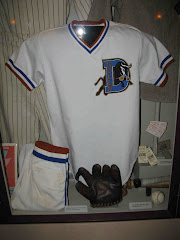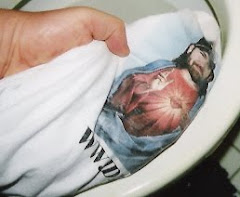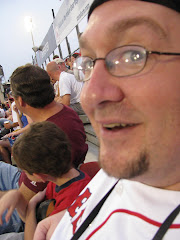 February is African American history month, and for that, one has to look at the black experience to see what baseball has been (the segregation of an entire race since Moses Fleetwood Walker), what it had to go through (the discrimination and resistance to Jackie Robinson), what it was possible that it could achieve (Hank Aaron, Willie Mays, and Bob Gibson, to name a few), and to what it is becoming (a shift to the NBA and NFL save some really great young talent like Jason Heyward, CC Sabathia, and Ryan Howard).
February is African American history month, and for that, one has to look at the black experience to see what baseball has been (the segregation of an entire race since Moses Fleetwood Walker), what it had to go through (the discrimination and resistance to Jackie Robinson), what it was possible that it could achieve (Hank Aaron, Willie Mays, and Bob Gibson, to name a few), and to what it is becoming (a shift to the NBA and NFL save some really great young talent like Jason Heyward, CC Sabathia, and Ryan Howard).We have gone from the days of teams being worried about fielding an all black outfield to teams that can't field African American players (Houston's 2005 World Series team is a perfect example). And while there is color on the skin, it's from darker skinned players that hail from the countries that lie south of the American border. And while Martin Dihigo represents a somewhat similar and somewhat different experience, his Cuban heritage lacks resonance with the African American world of today.
For that, we go to the dramatic works of August Wilson to find Fences, the tale of Troy Maxson, a former Negro Leaguer who hit home runs like nobody other than Babe Ruth and Josh Gibson, but who was unable to play because of his skin color. Where Buck O' Neil felt that he was right on time, Maxson is spiteful for coming along way too early. He has gone so far as to push his son Cody out of a football scholarship so that sports can never do to him what they did to Troy, and for that and many other misguided things that he did, he's a larger than life idiot. He cheats on his wife and knocks up his mistress, who later dies in childbirth, leaving Troy's 2nd wife Rose to care for the baby and live in a loveless marriage. He fights for the right to drive a garbage truck despite not having a license and figures that nothing will ever become of it because it's so easy.
And for this, it's impossible to like him as a person. I felt the same way about Satchel Paige after reading the tales of his womanizing. The man could pitch like a machine, but I don't have to like the man off the field (in fact, his kids came to hate him as well). But alas, such is the biography that Mark Ribowsky wrote and that I came to sluggishly move my way through (Don't Look Back).
But with the August Wilson experience, the pain is all eventually gone and the mother makes the son go to the funeral, thus paying his last respects to his father and hopefully burying him instead of carrying him on his back forever.
And for that, perhaps there is meaning, but I can't say that it moved me the way that I hoped it would save a few lines such as:
She asked me when I met her if I had gotten all that foolishness out of my system. And I told her "Baby, it's you and baseball all what count with me." You hear me, Bono? I meant it too. She say, "Which one comes first?" I told her, "Baby, ain't no doubt it's baseball... but you stick and get old with me and we'll both outlive this baseball."
And with that, I think of my wife and how she "puts up with" my baseball infatuation and how lucky I am to have her, and it makes me realize that there are good things in life and they're more than just a game, but the game is nice.
I think about what it means to be a hero or a role model and I realize that if we don't have the ability to care for other people and treat them well, then we might be a good enterainer, but we're not much else.
It's just a shame that so many people, historically in reality and in fiction, can't do the same. Perhaps, it's time to focus more on the real than on the fake and get in the real game.














No comments:
Post a Comment